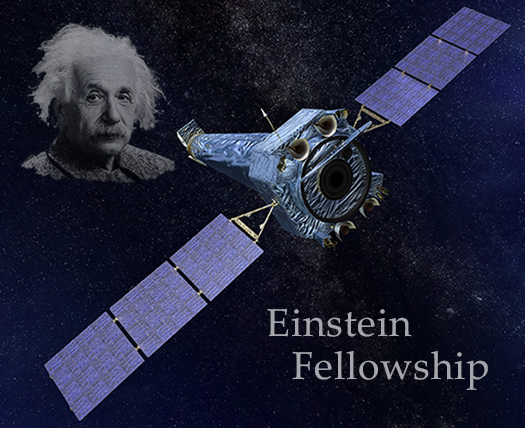For Release: Apr 04, 2019
NASA

NASA has selected 24 new Fellows for its prestigious NASA Hubble Fellowship Program (NHFP). The program enables outstanding postdoctoral scientists to pursue independent research across NASA Astrophysics, using theory, observation, experimentation, or instrument development. Each fellowship provides the awardee up to three years of support.
The NHFP preserves the legacy of NASA's previous postdoctoral fellowship programs – the Hubble, Einstein and Sagan Fellowships. Once selected, fellows are named to one of three sub-categories corresponding to three broad scientific questions NASA has sought to answer about the universe:
- How does the universe work? — Einstein Fellows
- How did we get here? — Hubble Fellows
- Are we alone? — Sagan Fellows
The NHFP is one of the highlights of NASA's pursuit of excellence in space science.
"I am excited that this outstanding group of young scientists have accepted NASA Hubble Fellowships," said Paul Hertz, Astrophysics Division director at NASA Headquarters in Washington, D.C. "I am confident that the research they do will address the most compelling questions in astrophysics and have an impact on our field far beyond the three-year duration of their Fellowships."
The newly selected NHFP Fellows will begin their programs in the fall of 2019 at a host university or research center of their choosing in the United States. The list below provides the names of the 2019 awardees, their host institutions, and their proposed research topics.
2019 NASA Hubble Fellowship Program:
How does the universe work? — Einstein Fellows:
- Dillon Brout, University of Pennsylvania, Improving Cosmological Constraints with the Dark Energy Supernova Program and a Decade of Type Ia Supernova
- Andrew Chael, Princeton Center for Theoretical Science, Simulating and Imaging Flaring Black Holes on Horizon Scales
- Jose Maria Ezquiaga, University of Chicago, Precision Cosmology with Present and Next Generation Gravitational Wave Detectors
- Ting Li, Carnegie Observatories, Constraining Dark Matter with Stellar Streams and Dwarf Galaxies
- Renee Ludlam, California Institute of Technology, A New Light on Neutron Stars
- Yao-Yuan Mao, Rutgers University, The Galaxy-Halo Connection: Probing the Dark Universe with Galaxies
- Shuo Zhang, Boston University, Supermassive Black Holes and Exotic Physics in the Galactic Nuclei of Local Galaxies
How did we get here? — Hubble Fellows
- Emma Beasor, National Optical Astronomy Observatory, The Evolution of Massive Stars to Supernovae
- John Chisholm, University of California, Santa Cruz, What Reionized the Universe?
- Eric Coughlin, Princeton University, The Appearance of Disappearing Stars: Mass Ejection, Fallback Accretion, and Jets from Weak and Failed Supernovae
- Anna-Christina Eilers, Massachusetts Institute of Technology, The Formation and Growth of Supermassive Black Holes at Early Cosmic Epochs
- Hui Li, Massachusetts Institute of Technology, Bridging the Gap Between Galaxy and Star Formation with Star Clusters
- Anna Faye McLeod, University of California, Berkeley, Stellar Feedback in the Era of Integral Field Spectroscopy
- Georgia Virginia Panopoulou, California Institute of Technology, A Unique Approach to the Determination of the Galactic Magnetic Field Using Starlight and Synchrotron Polarization Observations
- Vadim Semenov, Harvard University, Modeling the Turbulent Evolution of Galaxies over Cosmic Time
- Justin Spilker, University of Texas, Austin, Taking a Census of Galactic Winds with JWST, ALMA, and SOFIA
- Feige Wang, University of Arizona, Probing Cosmic Reionization and the Growth of the Earliest Super-Massive Black Holes
- Coral Wheeler, Carnegie Observatories, Ultra-High Resolution Simulations of the Milky Way and its Satellites
Are we alone? — Sagan Fellows
- Jaehan Bae, Carnegie Department of Terrestrial Magnetism, Constraining Initial Phases of Planet Formation
- Jennifer Bergner, University of Chicago, Connecting Interstellar and Planetary Chemistry
- Sebastiaan Haffert, University of Arizona, Seeing the Formation of Planets with High-Contrast Spectroscopy at MagAO-X
- Joshua Krissansen-Totton, University of California, Santa Cruz, Inverse Modeling of the Atmospheric Evolution of Lifeless Worlds to Understand Exoplanet Biosignatures
- Antonija Oklopcic, Harvard University, Spectral Signatures of Atmospheric Escape in Exoplanets
- Christopher Theissen, University of California, San Diego, Planetary Collisions around Low-Mass Stars: Constraining the Timescale for Collisions and Testing the Origin of the Kepler Dichotomy
An important part of the NHFP are the Symposia, which allow fellows the opportunity to present results of their research, and to meet each other and the scientific and administrative staff who manage the program.
The Space Telescope Science Institute in Baltimore, Maryland, administers the NHFP on behalf of NASA, in collaboration with the Chandra X-ray Center at the Smithsonian Astrophysical Observatory in Cambridge, Massachusetts, and the NASA Exoplanet Science Institute at Caltech/IPAC in Pasadena, California.
For photos and more information about the 2019 NHFP Fellows and this program, visit: http://www.stsci.edu/stsci-research/fellowships/nasa-hubble-fellowship-program/meet-the-fellows..
Media Contacts:
Megan Watzke
Chandra X-ray Center, Cambridge, Massachusetts
617-496-7998
mwatzke@cfa.harvard.edu
Christine Pulliam
Space Telescope Science Institute, Baltimore, Maryland
410-338-4366
cpulliam@stsci.edu


